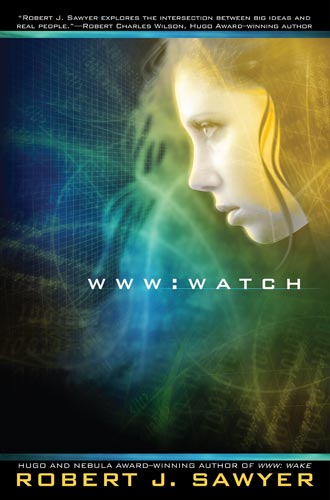WWW:Watch (2010) by Robert J. Sawyer follows hot on the heels of WWW:Wake (2009) and is an enjoyable and stimulating take on artificial intelligence and the spontaneous manifestation of consciousness. Given that both books are relatively short by genre standards and that WWW:Watch resumes at the precise moment where WWW:Wake left off, I see no reason not to review both books simultaneously. Also, if these books seem up your alley after the review, make sure to check out our giveaway.
The story arc carried through both novels centers on a young and brilliant girl who has been blind since birth because of a rare ocular disorder. One day, out of the blue, a researcher from Japan contacts her and her family with the hope of installing a digital signal processing prototype behind one of her eyes, with the aim of helping her see again. While the surgery at first appears to be a failure, Caitlin quickly realizes that she is able to see virtual space, the World Wide Web, and the connections it generates.
Parallel to the development of Caitlin’s new vision, readers are given glimpses of a being slowly moving towards awareness of the world and of itself. This being, as readers will quickly infer, is a nascent intelligence that resides in the World Wide Web. Mr. Sawyer is adept at introducing complex theories on intelligence and cognitive development and presenting them in an appealing way; one of his many talents.
What pleased me most about the book is the sense of wonder and novelty that Mr. Sawyer manages to gift his narrative. Readers will feel like they are seeing the world for the first time, believe it or not, through the eyes of a young blind girl.
Watch and Wake straddle the period right before the singularity – that moment where human history takes a dive off the deep end and no one knows where it will surface again. While Mr. Sawyer does entertain in both books, I see no practical reason why there could not have been only one book. As such, while the pace doesn’t feel slow and drawn out, there does seem to be a lack of substantive plot development when both books are considered individually.
Sadly, a number of unfulfilled plot lines leave the last installment, as yet unnamed, a fairly predictable conclusion to the WWW trilogy. Regardless, Mr. Sawyer scores at least an 8 out of 10 on the entertainment level, even if his abuse of social-medial colloquialisms (woot!, brb, omg) does leave readers feeling like they have just read am AIM chat log.
Mr. Sawyer, the creator of Flash Forward, is a pretty creative guy. In Watch and Wake he mixes the right amounts of science and fiction to create a fairly seamless and enjoyable reading experience, albeit one that will appeal mostly to the intellectual YA / teen audience. I recommended the WWW trilogy for those with an interest in near-future fiction who enjoy stories about the emergence of AIs or are simply interested in developmental psychology. I do not recommend this series to well read science fiction aficionados, who will surely see in it, as did I, all the excesses of an author catering to his audience.
More inexpensive ebook goodies!
15 hours ago



4 comments:
Looks good, I'll have to check it out. I'm a big fan of the tv show Flashforward although I know it's not much like the book. Cool ideas though.
Flashforward is a half decent show, might take a look at these books. thanks.
WWW:Watch seems like a really good book. Would love to read it.
Saw Iron Man 2 a few weeks ago (Asia gets it first) stay for the end of the credits for a surprise.
Post a Comment